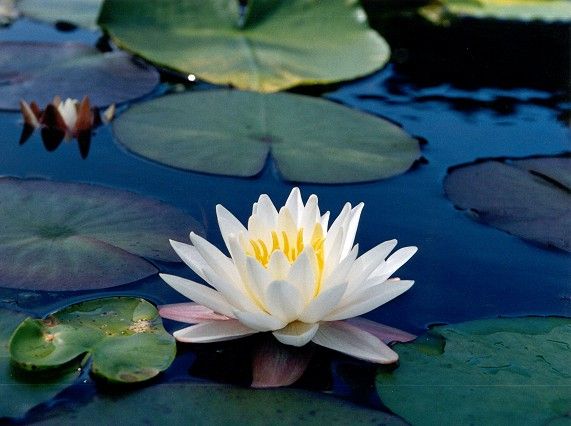 In the muskeg below the SJC uplands gravel quarry, there is a pond near
the Northeast corner in which grows the white waterlily pictured here
(photo taken in 1998). The white waterlily (Nyphaea odorata) is
native to the eastern United States. It has been introduced throughout
much of the United States as an aquatic ornamental plant.
In the muskeg below the SJC uplands gravel quarry, there is a pond near
the Northeast corner in which grows the white waterlily pictured here
(photo taken in 1998). The white waterlily (Nyphaea odorata) is
native to the eastern United States. It has been introduced throughout
much of the United States as an aquatic ornamental plant.
In a conversation I had with Mary Stensvold (regional botanist with the US Forest Service in Sitka), she indicated that this particular pool is the only known location for this species for hundreds of miles. Sometime after that conversation, I read the book Sitka: Portal to Romance by Barrett Willoughby. It was published in 1930 and contains a substantial section describing time spent with E.W. Merrill (a relatively well known local photographer in the early 1900's). The following passage caught my attention:
He told us he had sent to the States the year before for
some white water-lily bulbs. After their arrival he spent
a month planting them in ponds at different levels above
the sea in the hope that they would thrive and make more
beautiful those isolated lakes which perhaps only his eyes
have seen or will see for years to come. "I wish I might
bring you some of the first blossoms," he said, looking at
Kay, who was very lovely and golden in the sunlight. "But
they have not yet bloomed. The native yellow water-lilies,
on which the moose so loves to feed, are in full flower, but
don't you agree with me that there is something -- well,
intangibly beautiful in the thought of those delicate white
lilies of the South floating up there on our Northern mountain
lakes? It's like -- bringing a lovely woman home from a
foreign land," he finished.
This made me wonder if perhaps these flowers had originally been
placed by Merrill. In some further investigation I found
a Washington department of ecology
informational page
(the species is considered invasive in Washington) that indicates it is
believed that the waterlily was introduced to Washington during the Alaska
Pacific Yukon Exposition held in Seattle in the late 1800s.